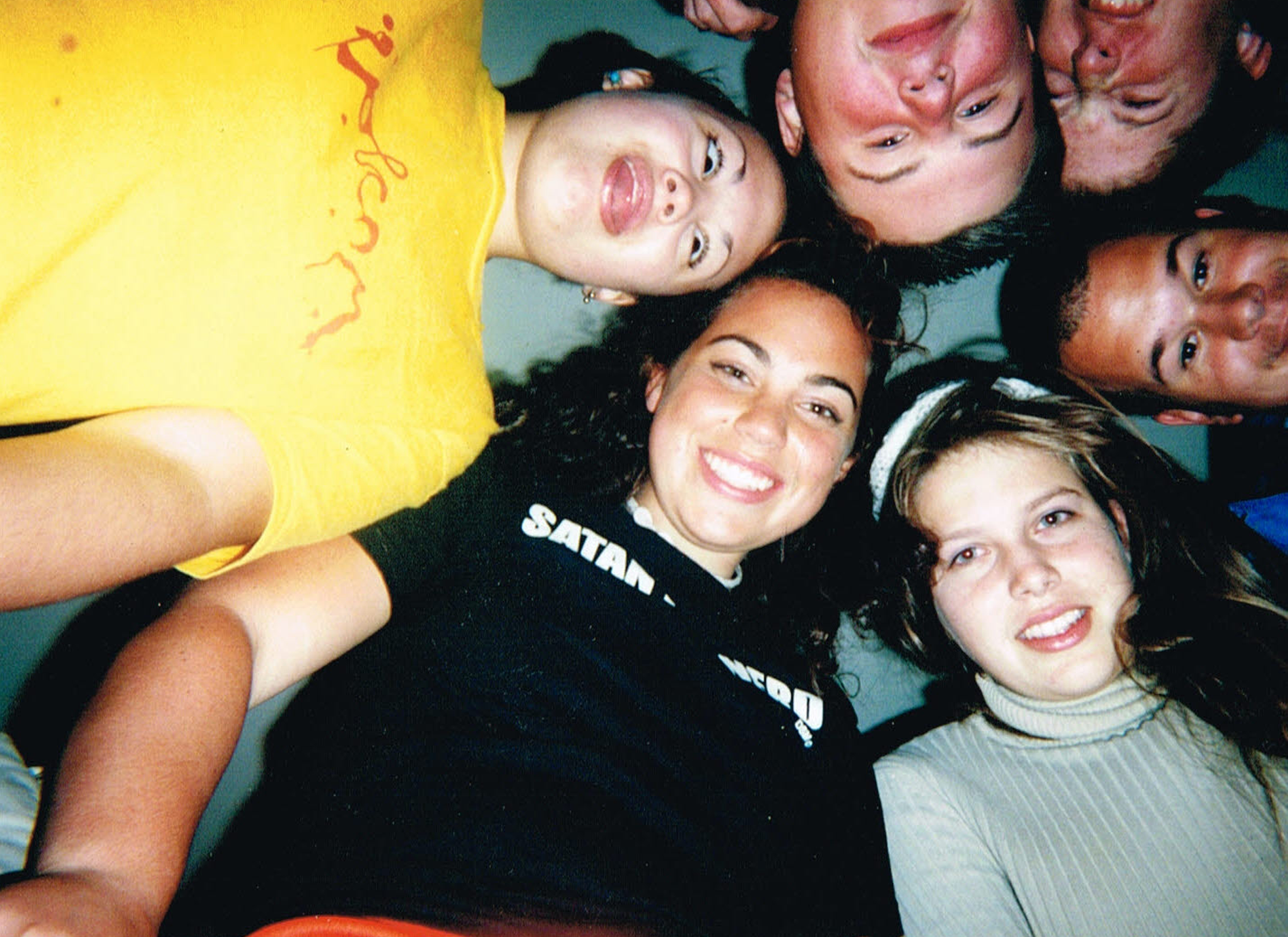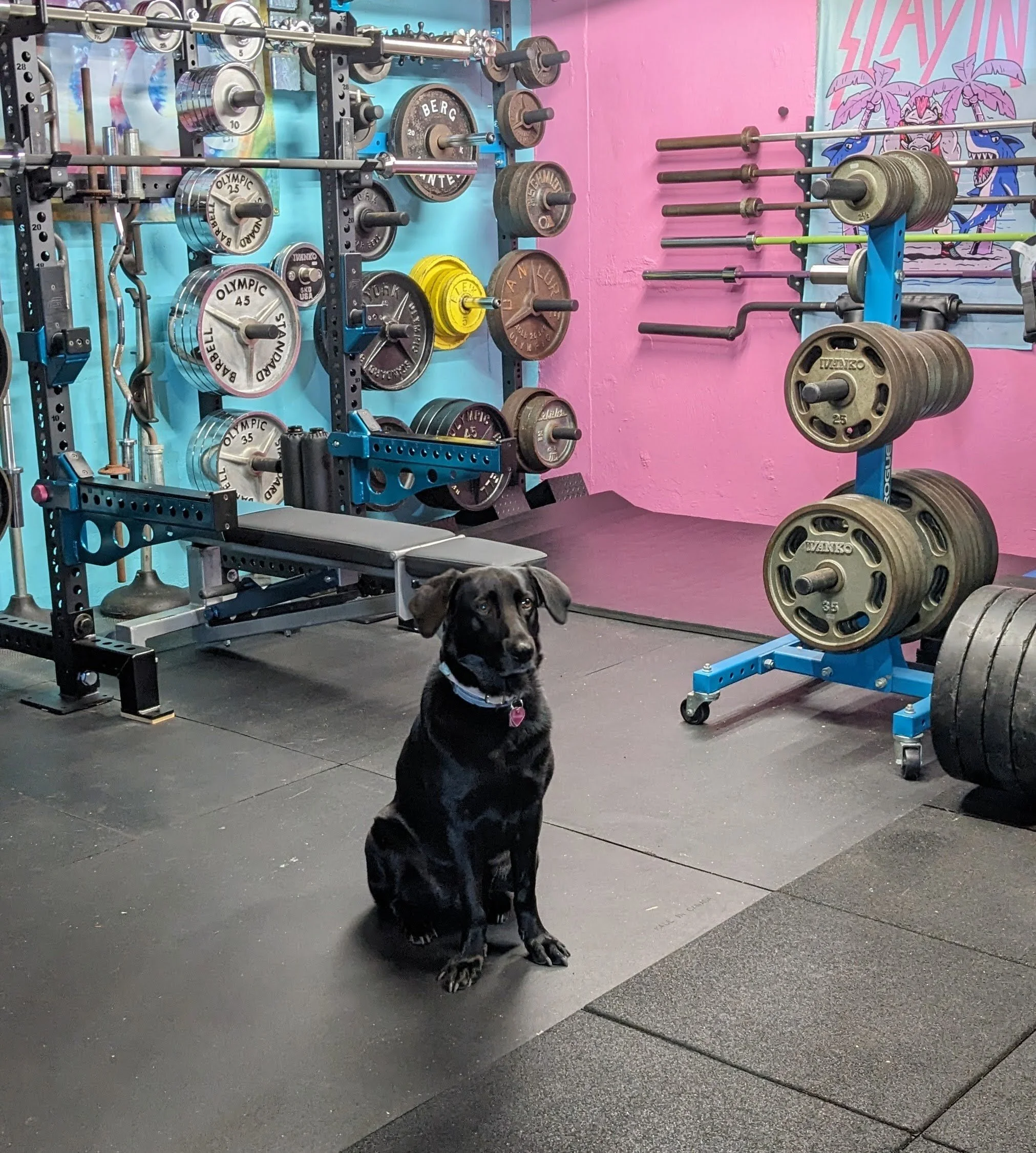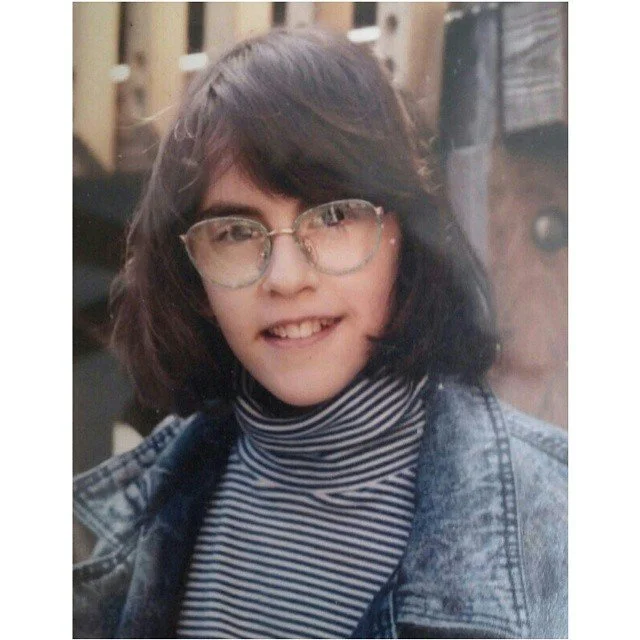Reconditioning Fitness, with Muscle Brunch
Penina Gal (they/them) and J.R. Uretsky (they/them) traveled from New York and California to find each other in Providence, RI. Across the past decade here, they’ve worked in cartooning, illustration, music, performance art, education, and on curatorial practices—and have been active in spots like Binch Press / Queer Archive Work and the Dirt Palace. During the pandemic, a small home gym sparked a big idea, and now the duo’s putting their experience and energy into developing a queer/community gym called Muscle Brunch.
The Well (TW): In our first round of questions, you teased a story about a lost bet, and the resulting acquisition of Bob Barker’s leg hair. We’ll get to Muscle Brunch, but this must be addressed.
J.R. Uretsky (JRU): Lol. My buddy Annabel and I went to Bible College in Los Angeles. Our dorms would go to TV tapings, and we had plans to be in the audience of The Price is Right. Annabel and I grew up together; she was always too nice, and kids in high school would take advantage of that. I once caught our friend Justin, who had been in and out of cancer remission his whole life, attempting to obtain Annabel’s lunch money, claiming that she should just give it to him because he had cancer. I called him out on it, and he apologized and granted us one free use of his “cancer card.” Annabel kept her lunch money, and we forgot about the whole interaction until a few years later when Annabel approached me with a problem, a lost bet. We had to get this lock of hair. We knew it was time to use the “cancer card,” and called Justin to get his blessing and set off to the set of The Price is Right.
Bob, a true performer, would do audience work during the commercial breaks. He was answering audience questions when Annabel and I rose from our seats, demanding Bob’s attention. We told him about our friend Justin, his cancer journey, his bravery, and his one wish to have a lock of Bob Barker’s hair. Bob didn’t hesitate to respond, “Well, girls, I don’t have much left on my head, but I got plenty of leg hair!” Annabel rushed the stage with scissors she had snuck past security as Bob calmly began to cuff a pant leg. Before I knew it, she was shearing his shin. When she finished, she kissed him on the cheek, hopped off stage, and dumped a bunch of gray hair into my hands. We framed it, and it hung in our dorm room.
TW: What a legend! So how’d you both grow up?
Penina Gal (PG): I was a nerdy kid in NYC, really into reading, drawing, and basketball. I was what was then just called “a tomboy,” since we didn’t have the acknowledgement or terminology for queer kids that we do now. I made a comic about it, Baller Baby.
JRU: I grew up on the California coast in the 1990s, which basically means that I call everyone "dude" and will never fully grasp how to dress for different kinds of weather. I played in a ska band in high school and was super into Jesus, so I assume I was pretty annoying. I moved to Los Angeles at seventeen to attend Bible College and become a youth pastor. In my second year at school, I realized I didn't like Jesus or youths and focused my energy on making art.
Above: "This is from our first public program, Art/PE, hosted by the Dirt Palace and featuring trainers Penina Gal and Dulari Tahbildar" —MB
TW: Penina, in Baller Baby, you recall fantasizing about someday owning a pair of Nike Air Penny 2's. So that's like 1996-7? What are your all time favorite pieces of footwear?
PG: Yeah exactly. Those are still my favorite from a purely nostalgic perspective. My aesthetic favorite is probably the Jordan 3 in simple and clean colorways–I have them in “Muslin” and wore them to a wedding. I like classic Vans, too; can’t go wrong with black canvas and a gum sole.
TW: Providence has always been a DIY comics hotbed—who are some of your favs?
PG: Every single cartoonist in Providence is amazing. There are a handful of us at Binch, look all those folks up! My BFF Betsey Swardlick is not very online but is my favorite storyteller. Ariel Bordeaux, James Kuo, Leela Corman, Tom Hart, AK Summers, the list goes on. Ryan Alves recently handed me one of the funniest things I’ve read in a while. I’ll probably think of like twelve more people after this and feel bad for not listing them.
TW: And J.R., did your ska band have a pun name? The Skapostles? Skadam and Eve? Also, serious Q, what’s your take on the lasting importance of teenage ska bands?
JRU: I wish our name was Skadam and Eve or, more apropos of now Skadom and Skamorrah. The bands I was into as a teen represented a kind of male energy that I related to, but growing up female, I wasn’t allowed to access or show it. A very dumb ska band that has directly influenced my current practice is The Aquabats (more vibe than music). Like DEVO, they are very interested in building a community around their music or a myth about the band. There is something lovely and so stupid about that.
TW: Do you think the initial desire to be a pastor was more about wanting simply to perform? What’s the relationship there?
JRU: Totally. My work is basically satirizing Western Evangelical worship practices and rituals because they are powerful. Singing together is healing. I believe the Church uses this power to manipulate people, and I am horrified by that. In my performance, I create affective experiences akin to the church, sans a god or a religion. It’s just us singing songs about queer experiences, heartbreak, and going to therapy.
Above: "A picture of my high school Christian ska band, Kick Me Jimmy. I am wearing the “Satan is a nerd” t-shirt, and Annabel, our lead singer and Barker hair conspirator, is to my left." -JRU
TW: Were you focused mainly on music as a kid? Or up to other art projects?
JRU: When I was a kid, I created a room-cleaning robot using cardboard. I attached a piece of cardboard to my closet door frame and drew a robot with a massive mouth on it. The mouth was a big hole in the cardboard. I used it to put all my dirty clothes and toys inside until my room was clean, or rather until all my belongings were stuffed inside the closet. The closet robot was my solution to cleaning my room and best illustrates “my thing,” which is stupid creative problem-solving–like creative problem solving however, not for the most efficient or best solution but rather the stupidest, weirdest, or funniest solution to a problem.
TW: How did you two meet and form this collaborative practice?
PG: We vaguely met through both being around the Providence art world, and I thought J.R. was cute and booked their band to play a show that ended up being moved to the grossest, moldiest punk house basement I’ve ever been in. At least the bands were good. We’re married now, and we have pretty different art practices, but we both got really burned out by jobs and decided to chase this gym idea as I got more into perfecting our home gym and started casually training some friends. It just sort of developed as the only thing we could think of to do that maybe would pay us while also feeling good and benefiting our direct community.
TW: Let’s get to the gym idea then...what’s the quick pitch?
MB: Muscle Brunch is rooted in actively undoing the damage the fitness industry has done to women and queer people. We are not into exploiting people’s body insecurities and shame for profit. When the pandemic began and Penina built a home gym, friends would come over and say things like, “I don’t like going to gyms, but I’d come to *this* one!” This got us thinking about how Rhode Island doesn’t have a gym that specifically offers a welcoming and safe environment for its queer and female residents.
Above: "Our basement gym, with our dog Bobby." —MB
TW: How is Muscle Brunch different, in practice? What’s been the strategy to tackle these issues?
MB: We sent out a survey through local listservs and social media, and out of 114 responses, 83% of the individuals polled said they would be interested in joining a gym like Muscle Brunch. We asked how and why these demographics would use an inclusive gym, and learned a few things:
Women and queer people often feel uncomfortable or unwelcome in gyms due to potential discrimination, judgment, or harassment.
Our customer base requested a gym that centers queer, trans, and female bodies of all sizes and abilities.
Women and queer people often make less money than cisgender men, making it challenging to afford gym memberships. Gyms in the greater Providence area cost about $60+ per month. In our poll, we found that only 18% of respondents could afford that.
Most gyms focus on weight loss, which can be harmful for people who have been socialized to believe that thinness is the ultimate fitness goal. This is what drives JR to want to start a gym that welcomes all levels and bodies. From a young age, JR was told that their body was wrong, which repelled them from fitness spaces. At Muscle Brunch, we aren’t working out to get thin, because health shouldn’t be measured by size. Health looks different on every person, and we want to celebrate that.
It is a struggle to find a gym that fosters a sense of belonging and support. Our customers may feel isolated or disconnected in fitness communities and with trainers that don’t understand what queer bodies go through. Our poll results showed that our customers are looking for bodywork professionals who understand queer needs, along with infrastructure like gender-neutral bathrooms and changing spaces.
TW: What's the process for getting involved and, is this a local only thing or is there a growth plan?
PG: Scaling is the goal of our vision. Right now, we’re running a few workshops for artists, and we’re getting our home gym ready to start offering personal and semi-personal training for 1-3 people at a time. We’ll link a sign-up form via our mailing list and instagram when that’s ready. The big picture dream is to offer a full gym with memberships. We’ll be looking for investors to make that happen! For now, folks who are interested can join our mailing list and follow us on Instagram.
TW: This feels like a huge project; lots of hours and focus. Where are you both at now in terms of balance...between work, studio practices, the gym, etc? Any healthy habits that you rely on?
JRU: I'm currently focusing on my recovery from being a full-blown workaholic, so I'm not putting too much pressure on myself to maintain healthy habits. I'm a bit skeptical of healthy habits because, for me, they have been more about "being productive" than "self-care." This is a product of living under capitalism and years of overachieving without ever asking myself what felt good. I'm working on my motivation around habits to avoid destructive thoughts like "If I start a workout routine, I will lose weight" and instead focus on "I swim four times a week because it feels good."
Above: Teenage Penina
PG: Capitalism and the medical industrial complex [are] messed up. I tried so hard to build an art practice and career with an undiagnosed sleep disorder that, among other things, has the same symptoms as pretty intense ADHD. I spent so many years thinking I was just lazy and bad and not understanding why it was hard for me to do things that I wanted to do. I’ve had to adjust my expectations and the pressures I put on myself to make art feel like something I enjoy again.
MB: Decolonizing Fitness has been an excellent resource for us as we think about creating a welcoming environment that is the antithesis of a toxic fitness culture.
TW: Outside of Muscle Brunch, you’ve been involved with Binch Press and Dirt Palace—what have these spaces meant to you and your practices?
PG: I can easily be a hermit and stay home and not talk to anyone for days. Binch has been a great way to stay connected to fellow artists and friends. Having access to such a great resource makes me want to print stuff more.
JRU: The Dirt Palace (DP) was how I made friends in Providence. It was also where I met other women(ish) people like me: buff, self-sufficient female-identified artists who loved music and art and could build things. I learned a lot from being a part of the DP community. The DP has had to adapt over the years. As an aspiring business owner and community builder, it has been helpful to watch how they have navigated adapting.
TW: Well, thanks so much for taking the time to speak with us, and best of luck with Muscle Brunch! If you have anything else upcoming you want to shout out, the mic’s yours.
PG: Honestly, I’m so proud of my gym. I put a lot of work into building a sick gym in our basement on no budget, and now I get to train people out of it. It feels like an art installation that gets fully realized when people use it! We’re almost ready to start running strength training services, and I’m working on a new zine about the pretty weird treatment I’m undergoing for my sleep disorder.
JRU: I’m really proud of my bands, Còmo Què Wao and J.R. and the Worship Band. I wish my entire life revolved around making music with my friends (and pushing paperwork for Muscle Brunch)!




